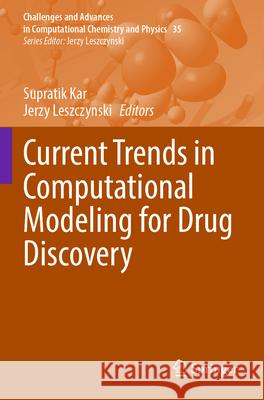Current Trends in Computational Modeling for Drug Discovery » książka
topmenu
Current Trends in Computational Modeling for Drug Discovery
ISBN-13: 9783031338731 / Angielski / Miękka / 2024
Current Trends in Computational Modeling for Drug Discovery
ISBN-13: 9783031338731 / Angielski / Miękka / 2024
cena 1006,38
(netto: 958,46 VAT: 5%)
Najniższa cena z 30 dni: 886,75
(netto: 958,46 VAT: 5%)
Najniższa cena z 30 dni: 886,75
Termin realizacji zamówienia:
ok. 22 dni roboczych.
ok. 22 dni roboczych.
Darmowa dostawa!
This contributed volume offers a comprehensive discussion on how to design and discover pharmaceuticals using computational modeling techniques. The different chapters deal with the classical and most advanced techniques, theories, protocols, databases, and tools employed in computer-aided drug design (CADD) covering diverse therapeutic classes. Multiple components of Structure-Based Drug Discovery (SBDD) along with its workflow and associated challenges are presented while potential leads for Alzheimer’s disease (AD), antiviral agents, anti-human immunodeficiency virus (HIV) drugs, and leads for Severe Fever with Thrombocytopenia Syndrome Virus (SFTSV) disease are discussed in detail. Computational toxicological aspects in drug design and discovery, screening adverse effects, and existing or future in silico tools are highlighted, while a novel in silico tool, RASAR, which can be a major technique for small to big datasets when not much experimental data are present, is presented. The book also introduces the reader to the major drug databases covering drug molecules, chemicals, therapeutic targets, metabolomics, and peptides, which are great resources for drug discovery employing drug repurposing, high throughput, and virtual screening. This volume is a great tool for graduates, researchers, academics, and industrial scientists working in the fields of cheminformatics, bioinformatics, computational biology, and chemistry.











